But, before the photographs of directors, let's start with a few shots from the demonstration of traditional Korean drumming that opened Battlefield Heroes:
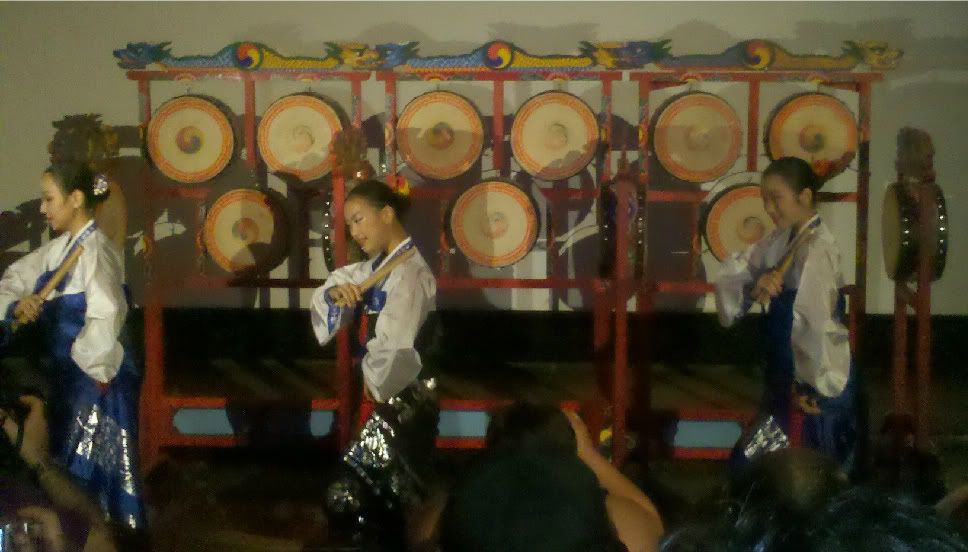
A fourth drummer (unseen) sets a beat for these three ladies to enter, go through a few steps, and take their places.
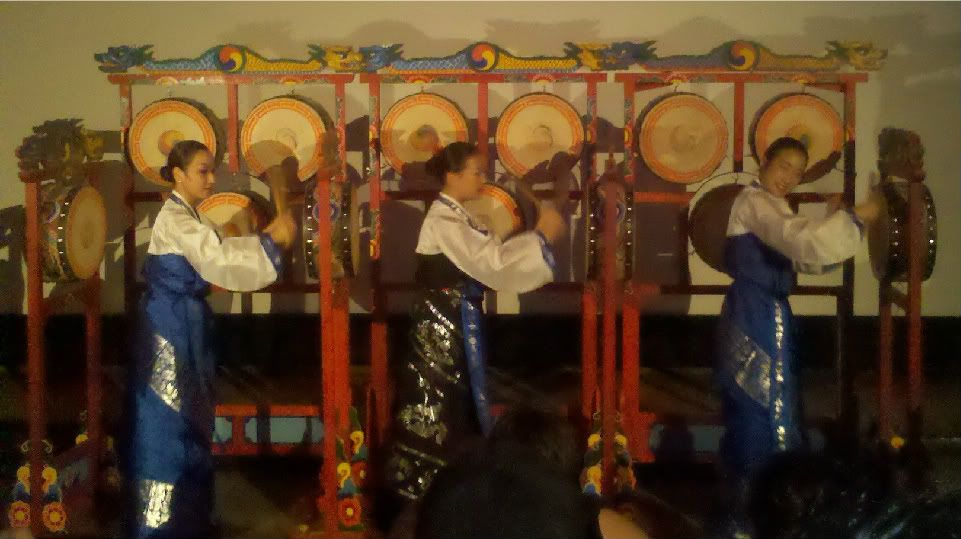
The blurring here is in part my phone, in part just what is inevitable when taking pictures of people playing the drums. It was a very cool demonstration, as each percussionist has five drums at her station, often spinning or bending over backwards to get from one to another. My fairly slow Droid would never catch that, always taking a picture like this when I snapped them doing something extra special nifty.
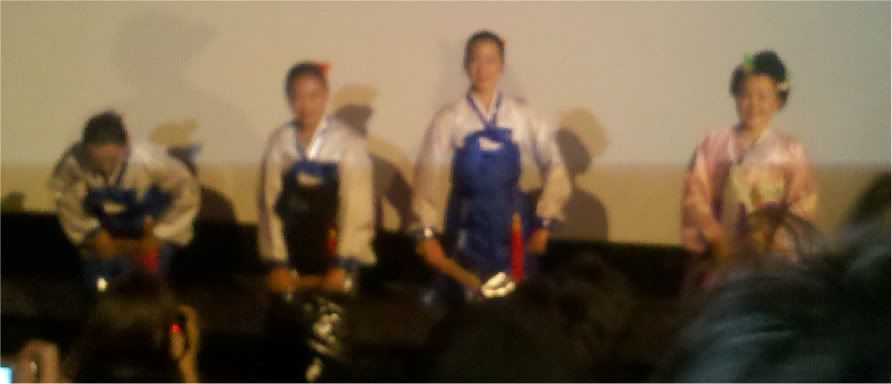
Apologies for the crappy quality of this picture, but it's the only one where I was able to capture the entire ensemble - the fourth member performed in a sitting position, off to the side - I could basically see the top of her head from the fourth row.
That was all part of what Cine-Asie did to promote their 2nd annual Korean Film Spotlight presentation; there was also a panel with the director of The Unjust and a calligraphy demonstration at various points. This allowed for a heck of a nice introduction for director Lee Jun-ik, seen here during the post-film Q&A (with translator):
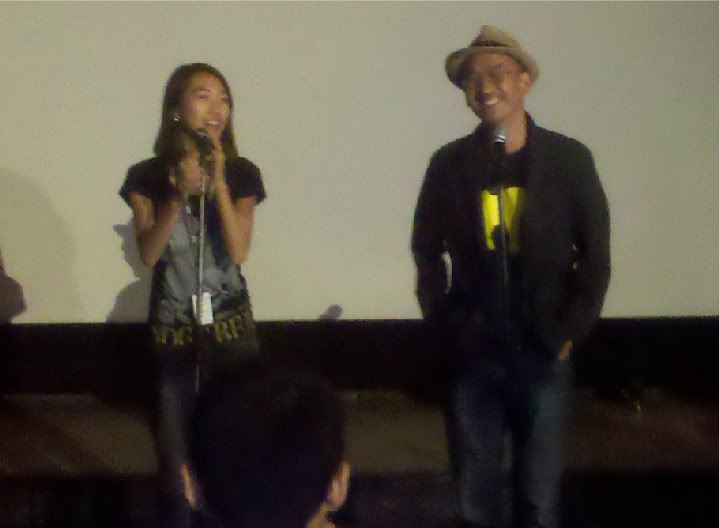
(Photography note: I'm glad that the picture that came out the best was also one where he was rocking the straw hat.)
Director Lee was one of the most pleasant surprises of the festival; I adored his The King and the Clown, but it's a fairly serious motion picture, and I was worried about the description of Battlefield Heroes being described as a comedy. I didn't expect him to be such a genial guy; the smile on his face here is typical of his demeanor throughout the session, happy to answer questions and go into what he was thinking about while making the movie. One of the things that he mentioned which I found interesting was that the three sons of Yeon Gae So Moon who clash over what to do when their father dies are at least partly meant to parallel the three sons of Kim Il-sung, who are quietly having their own succession issues (one got busted visiting Tokyo Disney on a fake passport; the border skirmishes of last year are suspected of being partially about the new heir apparent convincing the military he has what it takes to be king).
Of course, while I tended to think of Lee as a "serious" filmmaker based upon The King and the Clown, from his comments, it appears that he also considers it to be at least partly a comedy. I'm going to use that as further evidence that South Korea just draws their genre lines in different places than the West does.
Lee wasn't the only director there that day, Noboru Iguchi was there to introduce Tomie: Unlimited (and likely Karate-Robo Zaborgar).
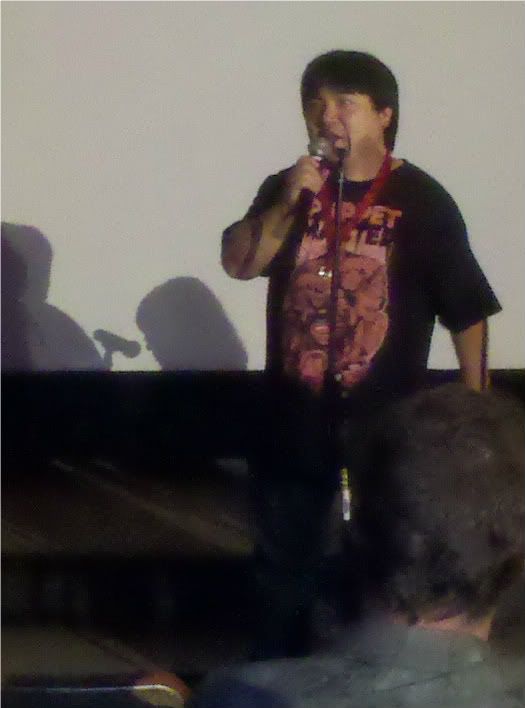
It's a terrible "judging a book by its cover" thing to say or even think, but he does sort of look like the type of guy who might make a career out of movies where schoolgirls get mutilated and have machines or other things grafted onto their bodies, doesn't he?
He does, at least, tend to make those movies fun, and he certainly made a lot of friends at the screening, talking about how he made Tomie: Unlimited using the original manga and cult film House (which has gained cool currency in North America over the last couple of years; not sure how it's viewed in its native land). I almost wish I'd been able to fit a Karate-Robo screening in to hear what he said about that even though I'd already seen it at NYAFF.
Part of that is because, as much fun as Sushi Typhoon is (and if they're willing to pay for Sion Sono to make stuff like Cold Fish, that forgives a lot of lame things), it does seem to be holding the filmmakers back a bit, keeping them stuck making low-budget splatter, attempting to manufacture the genuine cult success they found earlier in their years. Heck, seeing Yudai Yamaguchi and Tak Sakaguchi doing this stuff is almost sad; they have done better work, and it seems like a step back. Tomie: Unlimited isn't actually Sushi Typhoon, but it does feel like that sort of thing, especially compared to Karate-Robo, which was shot on film and looked rather polished compared to Tomie. These are talented folks who seem to genuinely like making oddball movies, and I'd like to see them making bigger, cooler things rather than stagnating.
After those two shows, the presentation of The Devil's Double seemed kind of weird - Lionsgate/Maple had security guys watching to make sure nobody whipped out a camcorder or phone and started recording (it kind of blows my mind that studios continue to freak out over that stuff while marching toward digital projection and distributing movies on hard drives), but there was no guests and really no introduction; it could have been just any preview screening and not part of a festival at all.
Redline
* * * * (out of four)
Seen 31 July 2011 in Theatre Hall (Fantasia 2011)
There have apparently been many movies named "Redline", most having auto racing as the subject, and many coming out within the past ten years. Most, apparently, are not very good. This one is, so here is a little help in picking it out should you see multiple Redlines lined up on the shelf - go for the animated Japanese sci-fi movie with the splashy artwork. It's frantically over-the top in every way possible, but isn't that what you want from a movie about incredibly high-speed racing in the future?
Of course, before we can get to the big race of the title, there's the qualifiers to get through, and the film opens with the Yellowline race. Sonoshee (voice of Yu Aoi) is in the lead with her crab-styled car, but fellow human "Sweet" JP (voice of Takuya Kimura) is making a late run with his tricked-out but old-school Trans Am. One advances to Redline by winning; the other is selected as a replacement when other racers drop out. Why would someone drop out of the biggest race in the galaxy, where the only rule is that your vehicle has to have wheels and anything else goes? Well, the planet selected is Roboworld, a militarized place that doesn't want it and has threatened to blow unwelcome guests away. That doesn't stop a number of competitors, including Machinehead Tetsuzin, who has fused his body with his car; Boiboi & Bosbos, magical girls from a planet of princesses; Lynchman & Johnny Boya, bounty hunters; Gori Rider, a corrupt cop; and Miki & Idoroki, small-time crooks. As the racers prepare on a nearby moon, JP's crustacean mechanic Shinkai (voice of Yoshiyuki Morishita) rebuilds his car while worrying that manager Frisbee (voice of Tadanobu Asano) will sabotage it as part of a deal with the mob.
That may sound like a lot of high-octane cazy, but there is much, much more. Main writer Katsuhito Ishii, co-writers Yoji Enokido & Yoshiki Sakurai, and director Takeshi Koike (making one heck of an ambitious debut here) stuff the movie with even more, like a Roboworld soldier who becomes stronger when he bawls. There's something called Funky Boy which is introduced to us with the phrase "Funky Boy must not be awoken", and by that point of the movie, the audience is either fried or thinking sure, I'll go with that. It's almost like Ishii, Koike, and company started out with a sci-fi racing movie and then asked themselves, with each pass at the design and script, how they could make the details just a little funkier and more science fictional.
Full review at EFC.
BKO: Bangkok Knockout
* * ½ (out of four)
Seen 31 July 2011 in Theatre Hall (Fantasia 2011)
In many ways, the relative merits of Bangkok Knockout can be summed up by how its cast credits are presented, both in the film and online: In the closing scroll, the first thing presented after a character's name was not the actor who played the role, but what style of martial arts he or she used. If I'd had some foresight, I would have used my phone to snap some pictures of that scroll, not for that curiosity, but because I've yet to find a site which matches character names with actors to use as reference while writing this review. The thing is, it's almost not a big deal; it's not like anybody is going to spend time critiquing individual performances for this one.
The bulk of the characters are students of the late Master Udon, competing in a contest to find Thailand's best stunt team with the winner getting a chance to work for Hollywood producer Mr. Snead. The surprise comes after their victory dinner - Udon's son Pod, niece Fern, and students Lerm, Ed, Ko, James, and Pom, along with their teacher Rom, wake up from a drugged stupor to find that their friend Joy has been kidnapped and they've got to fight their way past a group of professional killers in an unfinished housing development to rescue her, while Snead takes bets from rich foreigners on who will survive each encounter.
Director Panna Rittikrai and producer Pracha Pinkaew know this game pretty well; though their names may not be immediately recognizable, they are the ones who discovered and developed the careers of Tony Jaa, Jija Yanin, and other Thai action stars. There may be a Jaa or Yanin in this cast, but this likely won't be the movie that catapults them to stardom. Some other movie might; it's just that here, they are part of a large ensemble that is fairly homogenous. They're all capable enough, called on to do more or less the same thing between fights, with only a couple of the fighters called upon to establish much of an individual personality. Still, while none of the main cast display the charisma required to steal the picture, none of the fighters embarrass themselves. This, sadly, cannot be said for the supporting cast, who are almost all terrible, which is kind of annoying - since they're not fighting, they're just there to act, and one would hope they could do that at least a little.
Full review at EFC.
Tomie: Anrimiteddo (Tomie Unlimited)
* * ½ (out of four)
Seen 31 July 2011 in Theatre Hall (Fantasia 2011)
I had an interesting discussion with between Tomie: Unlimited and the film which followed it on the festival schedule. I was somewhat disappointed in the movie, and laid out where it felt like it failed to come together, to be told that, actually, all the stuff I was faulting it on was irrelevant: I was trying to apply high-minded metaphor and meaning to something that really had no ambitions beyond freaking the audience out with trippy grotesqueries.
Now, neither of us is wrong - just because original manga artist Junji Ito, co-writer Jun Tsugita, and co-writer/director Noboru Iguchi didn't necessarily see Tomie as a literal take on how the dead can force their way into the lives of the living doesn't mean I shouldn't think along those lines when I see it, and the guy I was talking to certainly enjoyed it for what it is. Stories are a collaboration between teller and listener, in practice at least. The trouble with Tomie: Unlimited is that there's a void in it that demands an explanation. If one is familiar with the source material and the history of the franchise, that will go in. The rest of us will see the strange things going on and maybe try to fill the hole in a way that doesn't quite work.
What is there? Well, we start with Tsukiko (Moe Arai), a high-school student who loves photography but is constantly outshone by her beautiful older sister Tomie (Miu Nakamura). One day, when Tomie cajoles Tsukiko into taking pictures of her to impress her boyfriend Toshio (Kensuke Owada), the head of the judo club whom Tsukiko also has a crush on, Tomie is killed in a freak accident. Cut to a few months later, when the Tsukiko and her parents (Maiko Kawakami & Kouichi Ohori) are having a thoroughly morbid dinner on what would have been Tomie's eighteenth birthday, when there's a knock on the door. It's Tomie, somehow seeming none the worse for the wear. Only Tuskiko seems to think there's something strange about this, especially since there's something about Tomie this time around that inspires even more extreme passions, both affectionate and violent.
Full review at EFC.
Pyeongyangseung (Battlefield Heroes)
* * * ¾ (out of four)
Seen 31 July 2011 in Theatre Hall (Fantasia 2011 - Cine-Asie presents Korean Spotlight)
Full disclosure demands that I mention that Battlefield Heroes is a sequel to an eight-year-old Korean movie, although it is still extremely funny and otherwise entertaining even if you've never seen Once Upon a Time in a Battlefield (which was made before director Lee Jun-ik got international attention for King and the Clown). So don't let that stop you if you get a chance to see this period slapstick war epic, because you don't get to see many of those, and it'd be a shame to miss this one for such a silly reason.
The year is 668 AD, and Korea is not yet united under one king. The Silla and Goguryeo kingdoms really don't have any beef with each other, but the Chinese Emperor wants Goguryeo toppled, so they push Silla and another allied kingdom to invade and take Pyongyang castle. Goguryeo is in turmoil, with its fierce general mortally wounded and dissension among his sons - pragmatic Nam-seng (Yoon Je-moon), bellicose Nam-geon (Ryoo Seung-ryong), and conflicted Nam-san (Kang Ha-neul). Silla general Kim Yu-sin (Jeong Jin-yeong) knows that the purpose of this strike is to weaken his army as much as to defeat Goguryeo, so he schemes to minimize his losses and hopefully have Silla come out stronger. All this is of little concern to a foot soldier called "Thingamajig" (Lee Mun-shik), who saw enough of war the last time he was conscripted, and is mostly concerned with another grunt in his unit, Moon-di (Lee Kwang-soo), who keeps volunteering and exposing them to danger.
There's even more political and military maneuvering going on, and I'm sure that many of those who have read this far are wondering just how funny seventh-century Korean politics and military strategy can really be (although at least the stuff with "Thingy" has potential, right?). And that's a valid concern - this is a pretty dense movie, with four armies and a couple dozen characters to keep track of. Fortunately, this appears to be the Blackadder version of Korean history, with foppish an ineffectual kings and battles decided on absurd turns of events. It's not the easiest material to make funny - or necessarily even comprehensible, especially if the viewer hasn't seem the previous film - but writers Jo Chul-hyun and Oh Seung-hyun do a fine job of packing everything the audience needs to know in while leaving plenty of room for laughs.
Full review at EFC.
The Devil's Double
* * ¼ (out of four)
Seen 31 July 2011 in Theatre Hall (Fantasia 2011)
You'd be forgiven for thinking that a movie taking place amid the inner circle of Saddam Hussein's family over the past twenty-five years, and featuring the potential plot twists and mind-benders of look-alikes, would be something fairly exciting. Unfortunately, the actual experience of watching The Devil's Double never gets beyond thinking about what an interesting idea this is, so that even the more lurid bits fall short of actually being exciting.
Latif Yahia (Dominic Cooper) was in the Iraqi army during the war with Iran, as were many, and he's a bright young man, but that's not why he gets selected for special duty: He bears an uncanny resemblance to his former university classmate, Uday Hussein (also Cooper), son of Saddam (Philip Quast), and is thus recruited to serve as Uday's double, standing in when it might be dangerous or inconvenient for Uday to do so himself. "Take the place of a hated autocrat at times when people might shoot at him" is not a job Latif particularly wants, but that's a family you didn't say no to at the time, and so Latif is given surgery to further increase their similarity. And so he comes to be kept in a gilded cage, living like the prince in a palace but without freedom - a situation somewhat shared by Sarrab (Ludivine Sagnier), Uday's current preferred mistress.
The Devil's Double is based upon true events and the real-life Latif's accounts of this life, and as the film goes on, one might find oneself wishing it was less "based upon" than "suggested by" or "inspired by" those stories. That last paragraph, after all, is not a story, but merely a set-up, one which would ideally be followed by the characters doing something interesting - Latif being recruited to do espionage work against the Hussein regime, or having to take Uday's place for an extended period and have to do horrible things to keep the secret, or becoming involved in a genuinely complicated and conflicted relationship with Sarrab. And while the script by Michael Thomas hints at all of these possibilities, it never up and runs with one.
Full review at EFC.
No comments:
Post a Comment